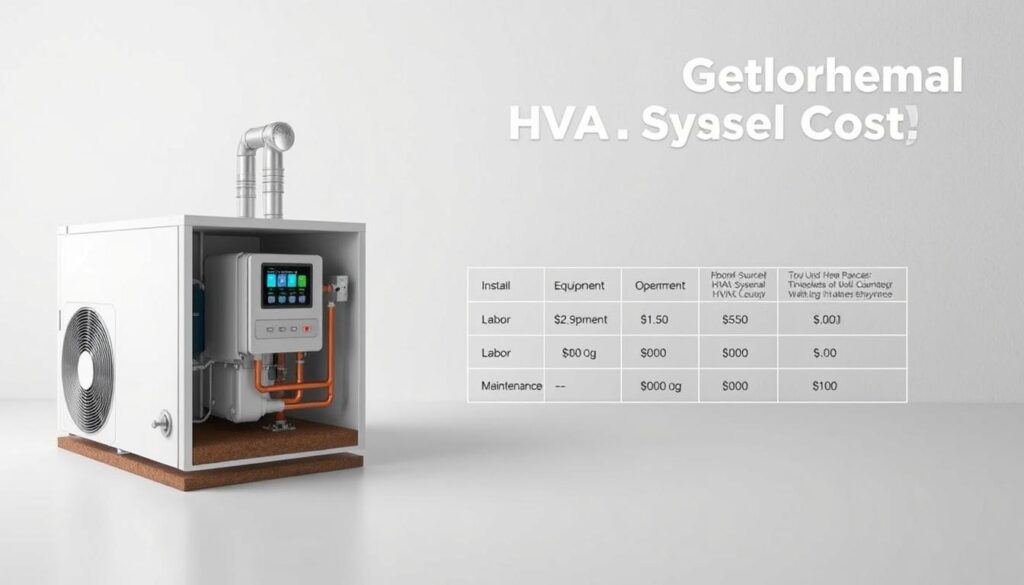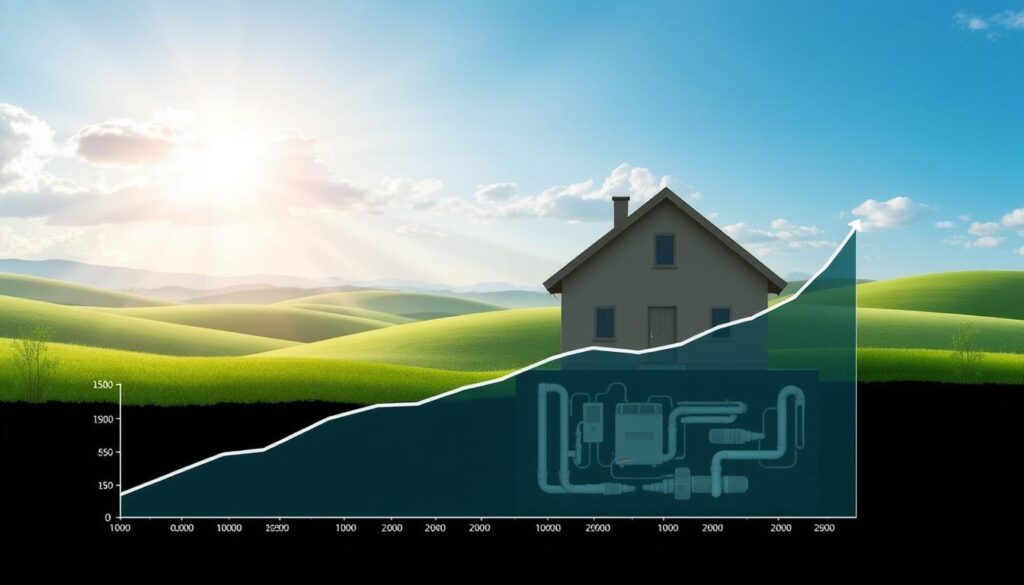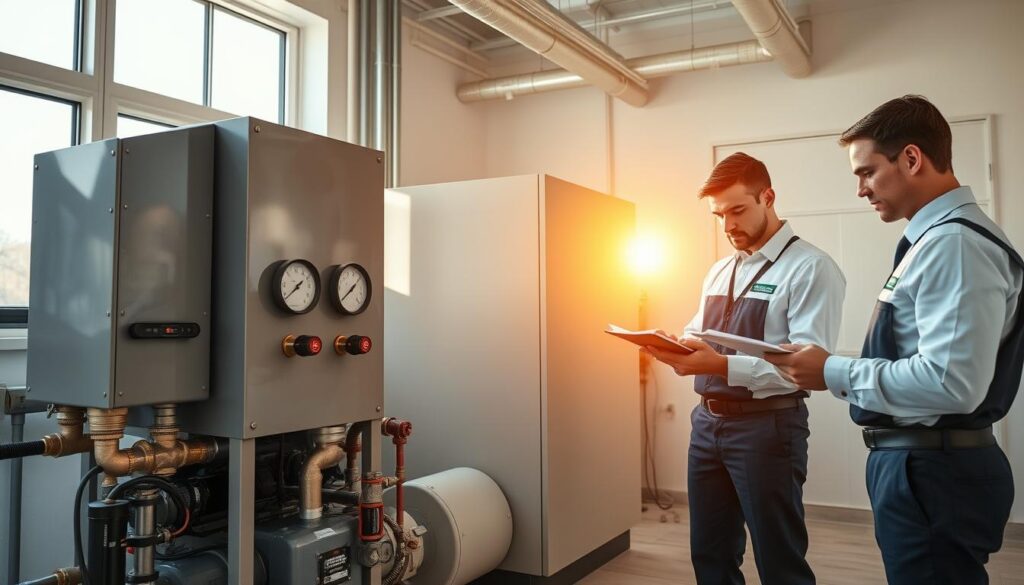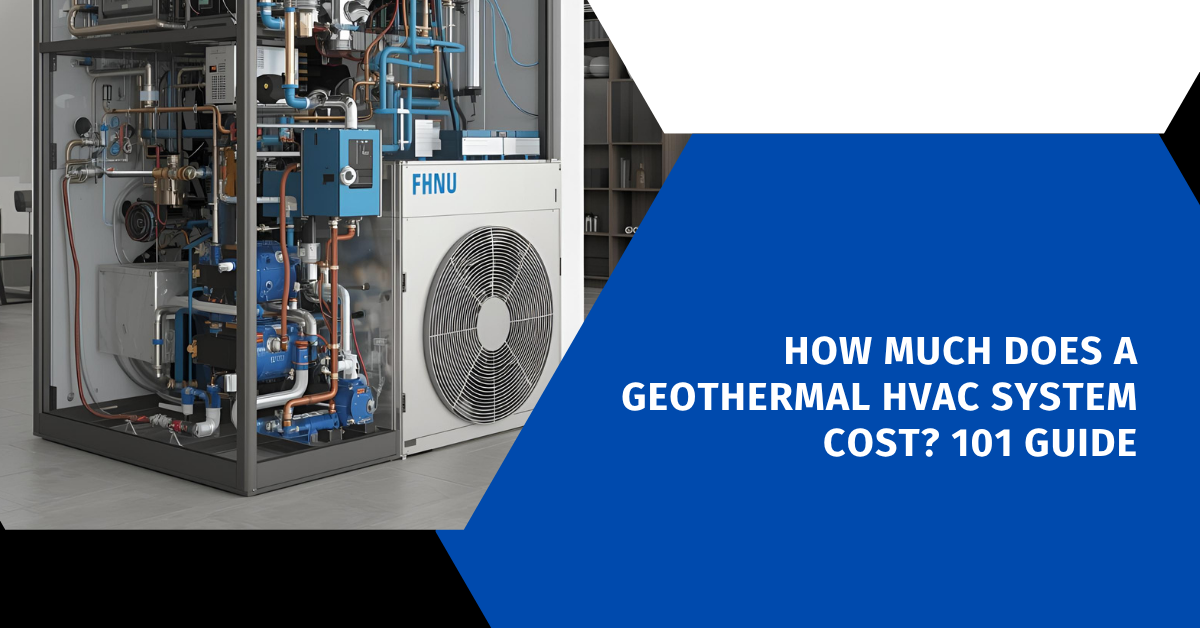Affiliate Disclosure
HVAC Guide Guys is a participant in the Amazon Services LLC Associates Program, an affiliate advertising program designed to provide a means for sites to earn advertising fees by advertising and linking to Amazon.
How Much Does a Geothermal HVAC System Cost? Looking into the cost of a geothermal system, you’ll find a cutting-edge solution for your home’s temperature needs. The initial cost is between $18,000 to $30,000. It might seem a lot at first.

Are you fed up with high energy bills? Wondering if there’s a better way to heat and cool your home? Geothermal HVAC systems might be the answer you’ve been looking for.
The cost of installing a geothermal system changes based on several key factors. Your home’s size, the soil around it, and how much energy it uses all play a part. Even though it costs a lot upfront, these systems save you money and help the environment in the long run.
Key Takeaways
- Geothermal HVAC systems provide sustainable home heating and cooling
- Initial investment ranges from $18,000 to $30,000
- Cost depends on home size, soil conditions, and energy needs
- Long-term energy savings offset initial installation expenses
- Environmentally friendly alternative to traditional HVAC systems
Table of Contents
Understanding Geothermal HVAC Systems Basics
Geothermal HVAC systems use the earth’s stable underground temperatures for heating and cooling. Knowing about residential geothermal system pricing and ground source heat pump expenses helps homeowners decide on this technology.
How Geothermal Heat Pumps Work
Geothermal heat pumps work by using underground pipes filled with a special liquid. This liquid transfers heat between your home and the earth. In winter, it pulls heat from the ground to warm your home. In summer, it cools your home by pulling heat underground.
- Consistent underground temperatures provide reliable heating and cooling
- Eliminates traditional fossil fuel dependency
- Reduces overall energy consumption
Types of Geothermal Loop Systems
The type of geothermal loop system needed depends on your property. Your residential geothermal system pricing will change based on the loop type:
- Horizontal Loops: Best for properties with extensive land area
- Vertical Loops: Ideal for smaller properties or urban settings
- Pond/Lake Loops: Excellent for waterfront properties
- Open Loop Systems: Utilize groundwater directly
Components of a Geothermal HVAC System
Ground source heat pump expenses include several key components for efficient climate control:
- Underground heat exchange loops
- Heat pump unit
- Indoor distribution system
- Refrigerant circulation mechanism
Understanding these basics shows the complexity and long-term benefits of geothermal HVAC technology.
Explore Our HVAC Shop
Looking for top-rated HVAC tools, parts, and accessories? Visit our shop and find the perfect solution for your needs.
Visit the ShopHow Much Does a Geothermal HVAC System Cost?
Knowing the average cost of geothermal HVAC is key for homeowners. It’s an energy-efficient heating and cooling option. A geothermal system is a big investment but offers long-term benefits.
Average Installation Costs
The cost of a geothermal HVAC system varies a lot. Homeowners usually spend between $12,000 and $45,000 for a full installation. This price is for both homes and small businesses.
Factors Affecting Total Price
- Property size and heating/cooling needs
- Soil type and ground conditions
- Loop system type chosen
- Local labor and installation costs
- Terrain complexity
Cost Breakdown by System Components
| System Component | Estimated Cost Range | Percentage of Total |
|---|---|---|
| Ground Loop System | $5,000 – $20,000 | 40-50% |
| Heat Pump Unit | $3,000 – $10,000 | 25-35% |
| Installation Labor | $2,000 – $8,000 | 15-20% |
| Additional Equipment | $1,000 – $5,000 | 10-15% |
“While the upfront costs of geothermal energy system installation might seem high, the long-term savings make it a smart investment for environmentally conscious homeowners.”
Your exact costs will depend on your site’s specifics and system complexity. Getting a professional assessment is the best way to know your exact costs.
Explore Our HVAC Shop
Looking for top-rated HVAC tools, parts, and accessories? Visit our shop and find the perfect solution for your needs.
Visit the ShopTypes of Geothermal Loop Installations and Their Costs
When you think about getting a geothermal HVAC system, knowing the different types is key. Each type has its own benefits and costs. This helps homeowners make the best choice for their homes.
When comparing costs for your home’s geothermal system, consider these main types:
- Horizontal Loop Systems
- Great for homes with lots of land
- Costs less to install than vertical systems
- Needs a lot of ground for the pipes
- Vertical Loop Systems
- Perfect for smaller homes or city areas
- Expensive to set up at first
- Doesn’t mess up the yard much
- Pond/Lake Loop Systems
- Most affordable if you’re near water
- Needs to be close to a steady water source
- Simplest to install
- Open-Loop Systems
- Uses water from the ground
- Less expensive to install
- Depends on water quality and local rules
Your home’s specific features will decide the best and cheapest geothermal loop setup. Things like how much land you have, the soil, and local geology are important. They help choose the right system and how much it will cost.
Installation Process and Timeline Considerations
Installing a geothermal heating and cooling system is a big job. It needs careful planning and expert help. Knowing the costs can help you get ready for this big project.
Before starting, you’ll go through several important steps. These steps are key to a successful geothermal system setup.
Site Assessment Requirements
A detailed site check is vital to pick the right geothermal loop setup. Experts will do a full check that includes:
- Soil composition testing
- Property landscape analysis
- Underground utility mapping
- Thermal conductivity evaluation
Permitting and Regulations
The cost of your geothermal system will depend on local rules. Each area has its own rules for installing ground loops. These rules may include:
- Zoning approval processes
- Environmental impact assessments
- Building permit applications
- State-specific geothermal system regulations
Installation Steps and Duration
The whole installation takes 2-3 weeks. It’s divided into several parts:
- Excavation and ground loop preparation
- Loop system installation
- Heat pump and indoor unit setup
- System testing and calibration
Getting it installed by pros ensures it works well. This saves energy in the long run. Work with certified geothermal contractors to get through the process smoothly.
Federal Tax Credits and State Incentives
Getting a residential geothermal system can be cheaper than you think. Thanks to big federal and state incentives. The current federal tax credit is a great chance for homeowners to cut their energy bills and help the planet.
The Federal Residential Renewable Energy Tax Credit gives a big 30% personal tax credit for installing geothermal systems until 2032. This means you could save thousands upfront. It makes the cost of a geothermal system much more appealing.
- Federal Tax Credit: 30% of total installation costs
- Applies to systems installed through 2032
- No maximum dollar limit on the credit
State incentives can also help a lot. Many states offer:
- Direct rebates for geothermal installations
- Property tax exemptions
- Low-interest financing programs
To save the most, look into local utility company incentives and state programs. Every area has its own financial benefits that can greatly lower the cost of your geothermal system.
Pro tip: Talk to a local geothermal installer who knows about local incentives. This way, you can get every financial advantage available.
Explore Our HVAC Shop
Looking for top-rated HVAC tools, parts, and accessories? Visit our shop and find the perfect solution for your needs.
Visit the ShopExplore Our HVAC Shop
Looking for top-rated HVAC tools, parts, and accessories? Visit our shop and find the perfect solution for your needs.
Visit the ShopLong-Term Energy Savings and ROI Analysis
Getting a geothermal HVAC system is a smart move for homeowners. It cuts down on energy bills and boosts your home’s value. The cost of your home geothermal system is worth it for the long-term gains.

Monthly Utility Cost Reduction
Geothermal HVAC systems can greatly lower your monthly bills. Homeowners see big savings:
- Up to 70% less for heating and cooling
- Up to 40% less for water heating
- Annual savings of $1,600 for a 2,500 sq ft home
Payback Period Calculations
Figuring out the return on your geothermal HVAC investment is key. It depends on:
- The cost of installing it
- Your local energy rates
- Tax credits and incentives
- Your home’s energy needs
| System Type | Initial Cost | Annual Savings | Payback Period |
|---|---|---|---|
| Horizontal Loop | $10,000 – $25,000 | $1,200 – $1,800 | 7-12 years |
| Vertical Loop | $20,000 – $35,000 | $1,500 – $2,200 | 10-15 years |
Long-Term Financial Benefits
Your geothermal HVAC investment has remarkable long-term benefits. It saves energy, increases your home’s value, and lowers maintenance costs. Plus, it cuts down on carbon emissions. Most systems last 25+ years, giving you steady financial gains.
Comparing Costs: Geothermal vs Traditional HVAC Systems
When looking at home heating and cooling, knowing the cost of geothermal HVAC is key. A comparison shows big differences between traditional and geothermal systems.
Traditional HVAC systems are cheaper upfront. A basic air conditioner and furnace might cost about $13,000. On the other hand, a geothermal system can start at $20,000 to $30,000. But don’t let the initial price tag discourage you.
- Initial Installation Cost (Traditional HVAC): $13,000
- Initial Installation Cost (Geothermal HVAC): $25,000
- Federal Tax Credit: 30% of total installation
The federal tax credit changes things a lot. With a 30% tax credit, your geothermal system’s cost could be just $4,500 more than traditional. This makes it a better deal.
Energy efficiency is another big plus. Geothermal systems can cut energy use by up to 70% compared to traditional HVAC. This means big savings on your bills over time.
Investing in a geothermal HVAC system is not an expense, but a strategic financial decision.
Your exact cost for a geothermal system depends on several things. These include your home’s size, local weather, and the ground conditions. Getting a professional to assess your home can give you the best estimate.
Explore Our HVAC Shop
Looking for top-rated HVAC tools, parts, and accessories? Visit our shop and find the perfect solution for your needs.
Visit the ShopExplore Our HVAC Shop
Looking for top-rated HVAC tools, parts, and accessories? Visit our shop and find the perfect solution for your needs.
Visit the ShopMaintenance Costs and System Longevity
Buying a geothermal HVAC system means knowing its upkeep and lasting power. With the right care, your costs can drop. These systems last longer and work better than old heating and cooling methods.

Regular Maintenance Requirements
Your geothermal HVAC needs regular checks to run smoothly. Important tasks include:
- Annual professional system inspection
- Air filter replacement every 3-6 months
- Checking refrigerant levels
- Cleaning heat exchanger components
- Inspecting underground loop connections
Component Lifespan Expectations
Geothermal systems are built to last. Each part has its own lifespan:
| System Component | Expected Lifespan |
|---|---|
| Indoor Heat Pump Unit | 20-25 years |
| Underground Loop System | 50-100 years |
| Distribution Ductwork | 25-30 years |
Good installation and upkeep are key. They help your system work better and last longer. Regular checks keep your costs down and your system efficient for years.
Factors That Impact System Efficiency and Costs
When you think about the cost of ground source heat pumps, many things matter. These factors affect how well your geothermal system works and its value. Knowing these can help you choose wisely for your green energy investment.
Your home’s details are key to its geothermal system’s efficiency. Important factors include:
- Home size and layout
- Existing insulation quality
- Soil composition and thermal conductivity
- Local climate conditions
- Current ductwork infrastructure
The place where your home is located greatly affects the cost of ground source heat pumps. Areas with steady underground temperatures are best for geothermal systems. The type of soil is also important – clay is better than rocky or sandy soil for heat transfer.
“The right geothermal system design can reduce your energy costs by up to 70% compared to traditional HVAC systems.” – Renewable Energy Experts
How much energy your home uses and local energy prices also matter. Getting a professional energy audit can show the best geothermal option for you.
New technologies are making geothermal systems more efficient. This makes them more appealing to homeowners who want green heating and cooling.
Conclusion
Figuring out the cost of a geothermal HVAC system involves looking at many factors. It’s not just about the price. These systems are a smart way to manage your home’s energy, balancing costs now with savings and benefits later.
Looking into the cost of installing geothermal heating and cooling, you’ll see prices vary. This is because of your home’s unique features. Even though the start-up costs are high, tax credits, state incentives, and big energy savings make them worth it for those wanting green solutions.
Choosing to get a geothermal HVAC system means doing your homework and talking to experts. Getting different quotes, knowing your land’s geology, and thinking about energy savings are key. Geothermal tech is a new way to cut down on carbon and save money on energy bills.
In the end, the cost of a geothermal HVAC system is just part of a bigger deal. It’s about making your home more efficient and eco-friendly. By thinking about both your wallet and the planet, you can make your home’s energy use better for you and the Earth.

